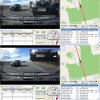Let me elaborate a little more on this.
Lets say you have 2 similar cameras and run one with 1080/60 and the other with 1080/30 settings and then go for a drive, then i am pretty sure most the plates the 1080/60 camera capture so will the 1080/30 camera.
Lets say your test drive is with 100 events that have a 100% capture on the 1080/60 camera, then the numbers with the 1080/30 camera should be up there too, maybe 98% or 95% at the very worst.
So the difference in captured plates is little, and it will not be like those plates the 1080/60 camera got and the other dident that the 1080/60 plates will be razor sharp captures and the 1080/30 ones will just be a blur.
From my own testing i have come to see that in many cases it take some guesswork to figure out the plate, and i have to verify that against our national plate register to make sure the plate and car model/color match what i can read on the plate.
You can get razor sharp plate captures on a Danish highway with cars passing right past each other at 80 km/h, but then its optimal lighting conditions and you will see several frames in row in the footage with the plate number.
But on bad days, then you will only have 1 chance where you might be able to read or guess the plate on that other car, and thats just the way it is with current technology in use.
In my own testing with 1080/60 Vs 1080/30 cameras ( not same sensors ) is it is damn rare the 60 FPS camera get a capture and the other one dont.
But what i do think is.
With future cameras with even more light sensitive sensors, those run with the 1080/60 setting should start to edge ahead of current sensors with 1080/30.
And they should do that due to the more light sensitive sensors will allow for those cameras to use a faster exposure, but at peak hours of day with optimal light conditions, but also as the light start to fade.
But i am also sure in the dead of night on a dark highway, or for that matter in a town with plenty of lit up billboards and lots of ambient light, then the new sensors will still struggle as they are by no means light sensitive enough for it to have a usable effect on dark roads.
But what i foresee now with my current knowledge is the new up coming sensors will not be a game changer at least not in regard to plate capture, they will be better and surely worth buying if you have no or just a old dashcam.
But if you have a current good camera, you really have to think if it is worth the upgrade if money is tight for you.
Off course if you are a dashcam addicted person than its a no brainer, get a new camera ASAP

but i just hope for those people they haven't gotten too exited, cuz then i think they might be disappointed with their new camera.
What i recommend you look for is a camera that first of all can handle the Vietnamese weather conditions, And then look at what features those cameras have you can use and which ones you might have to do without.

